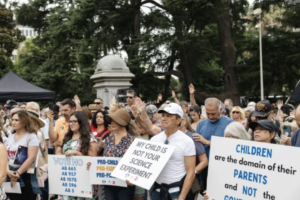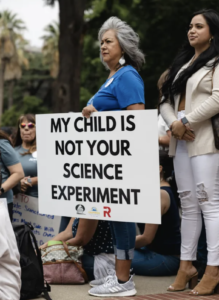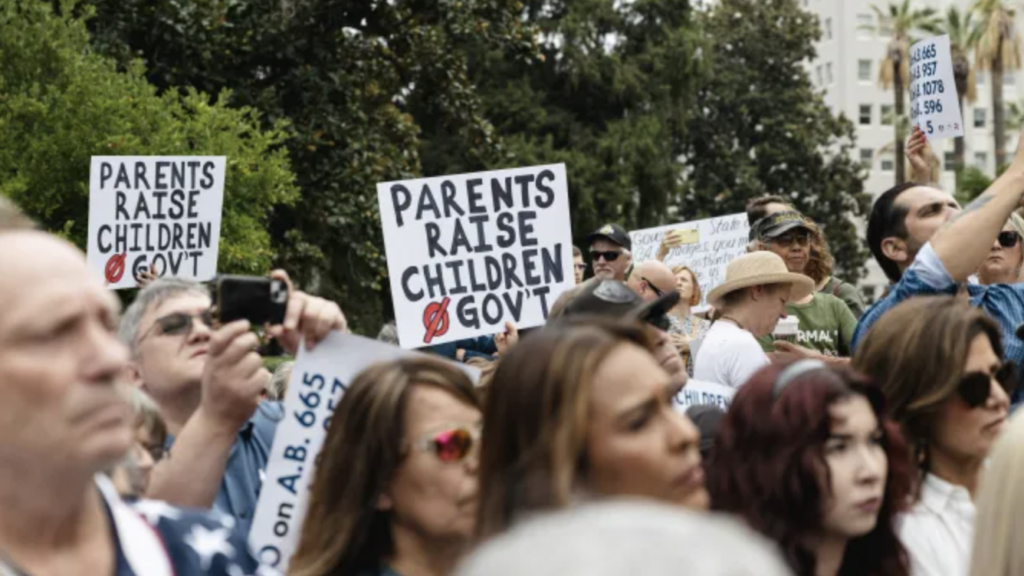About 1,000 Californians rallied in front of the state capitol steps in Sacramento late Monday morning to protest a series of bills they say would take away their rights as parents.
“We need more and more people to speak up until they can’t ignore us anymore,” Erin Friday, an attorney and co-leader of the western region of the pro-family nonprofit Our Duty, said during a speech at the rally.
Speakers criticized several bills making their way through the state Legislature that they say would diminish parental authority over children in areas of education and limit a parent’s authority to raise their children in line with certain religious or moral values related to gender.
One bill, which is being considered in the Senate, would allow a minor age 12 or older to receive transgender medical services without the consent of his or her parents if the mental health professional “determines that the [parental] involvement would be inappropriate” after consulting with the child.
The bill would also allow a mental health professional to place a minor in a residential shelter service if he or she determines that the minor is “mature enough to participate intelligently in the outpatient services or residential shelter services.” The mental health professional will also need to make his or her best effort to contact the parents in such cases.
Another proposed bill would change custody laws by requiring the court to consider the parents’ affirmation of “the child’s gender identity or gender expression” as part of the health, safety, and welfare of the child.
“This is the ultimate goal: Pull that child from parents like me who believe in biological reality, put them in a residential facility, take a lot of money from those parents through [court battles and taking classes], but in the interim, that child is going to be owned by the state,” Friday said.

Another proposed bill would centralize state power in relation to school district curricula and the use of certain textbooks. The legislation would prohibit boards from categorically excluding “topics related to race, ethnicity, gender, [and] sexual orientation” in curricula or classroom discussions. Violations could threaten state funding.
Sonja Shaw, the president of the Chino Valley Unified School District, said during the rally that the legislation will prevent local school boards elected by the parents from ensuring that the coursework is age appropriate. She noted that one of the reasons she ran for her position was to ensure young students were not being given sexually explicit coursework.
“Their goal was to break up the family unit and take control of our children,” Shaw said. “They were pushing perversion on our children in every possible way through curriculum and books all while our children were failing at reading, writing, and math. If you speak up, they have continued to show us … how they come after us with blackmail and bills to silence us.”
Other bills the speakers expressed concerns about included legislation that would train teachers to identify whether LGBT youth lack acceptance at home or within their communities, which opponents worry is intended to profile and target Christian parents.
Another would amend criminal harassment laws to include causing serious alarm to a school board member or school employee.
Although the California Catholic Conference was not represented by any speakers at the event, the official public policy voice for the Church in California has expressed concern about several bills considered by state lawmakers.

“This year, [California] is seeing an onslaught of bills attempting to separate parents from health care providers and educators around the sensitive topics of sexual health and reproduction,” Kathleen Domingo, the executive director of the California Catholic Conference, told CNA.
“The [California] Catholic Conference joins a growing number of Californians in opposing efforts to mandate curriculum in public schools for which there is no opt-out option, require all foster families to be affirming of gender transitioning, show preference in custody hearings to transition affirming parents, and attempts to remove local school board control of curriculum through parent participation,” she said.
Domingo added that parents should be seen as partners with educators, health care professionals, lawmakers, and other leaders.
“Parents are the primary educators of their children, and the vast majority want to do what is in the best interest of their children,” Domingo continued. “Removing parents from conversations and local decision-making from our schools only enshrines extreme ideology and leaves children without the guidance of their loving parents, in whose care God has entrusted these children.”

